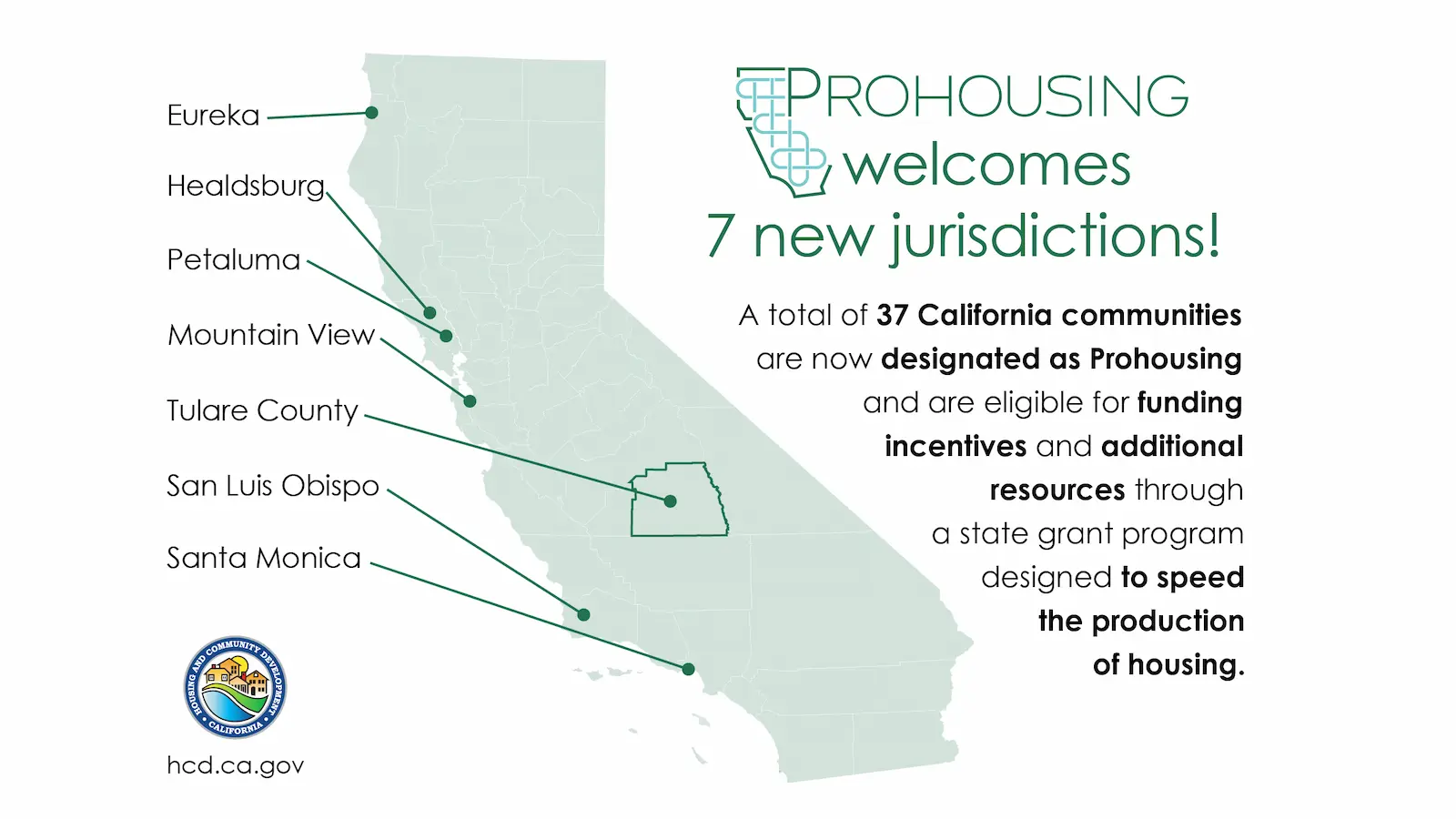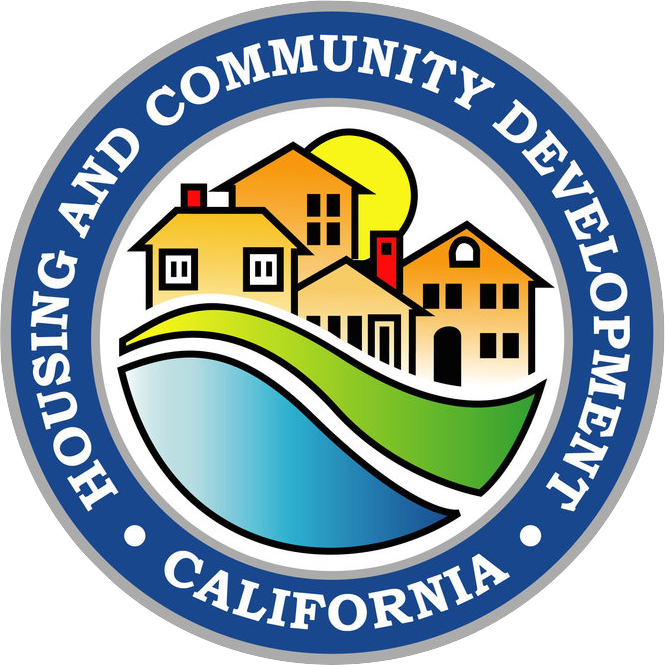Seven California Communities Earn Prohousing Designation

Governor Gavin Newsom announced today that the cities of Eureka, Healdsburg, Mountain View, Petaluma, San Luis Obispo, and Santa Monica, and the County of Tulare, have earned the coveted designation as Prohousing communities for their efforts to encourage development of housing at all income levels. This designation comes with funding incentives and additional resources to help speed housing production. Today’s announcement brings to 37 the total number of California communities designated as Prohousing.
Why it matters: The Statewide Housing Plan demonstrated that California needs to plan for 2.5 million new homes over the next eight years, with at least one million serving the needs of lower-income Californians. Reaching that goal will only be possible with the concerted efforts of state and local governments actively working to implement state housing laws and best practices that go above and beyond. The Prohousing Designation rewards communities that are willing to cut through red tape, reduce construction and development costs, and create housing policies with a growth mindset by providing them with funding incentives and additional resources that help scale up those innovative efforts.
What Governor Newsom said: “We need to aggressively build more housing to support Californians. Prohousing cities move to the front of the line when it comes to incentives, funding and other state resources. It’s critical for more communities to join in this distinction and build their fair share of housing.”
The Prohousing Designation Program is part of a package of supports, incentives, and accountability measures established by the 2019-20 Budget Act. By earning the Prohousing Designation, communities receive exclusive access to Prohousing grants and additional points in the scoring of competitive housing, community development, and infrastructure funding programs administered by the Department of Housing and Community Development (HCD).
“Communities whether large or small, rural or urban, are actively working to accelerate the development of housing for Californians at all income levels,” said HCD Director Gustavo Velasquez. “We are pleased to be able to reward our Prohousing partners with incentives to help them build on their innovative efforts to break down barriers to development.”

The use of incentives and supports encourages California communities to find creative solutions around barriers to housing production—barriers which have contributed to the current housing affordability crisis that has been decades in the making. Whether it is through accelerated production, equitable zoning, sustainable land use, reduced development costs, or financial subsidies, the 37 Prohousing communities are actively working toward the state’s goal of permitting 2.5 million new homes by 2030.
On January 23, HCD announced new permanent Prohousing Designation Program guidelines, as well as a Notice of Funding Availability for the second round of the Prohousing Incentive Program. Prohousing jurisdictions have until March 15, 2024, to apply for a share of the $9.5 million available through this current round of incentives.
For local leaders, earning the Prohousing Designation takes commitment to policies that accelerate housing production and minimize obstacles. These leaders must proactively work with state leaders to combat homelessness and increase the availability of affordable housing in their jurisdictions, bettering the quality of life for all Californians. Jurisdictions earning the Prohousing Designation are aggressively taking on that challenge with resilience, steadfast determination, and accountability.
City of Eureka
The City of Eureka is implementing a variety of policies to further housing production and reduce barriers to development. The city removed open space requirements in all zones and added residential subdivision alternatives. Each single-family lot is allowed up to four housing units, and a total of three units are allowed on each half of a lot split, bringing the total to six. The city also reduced parking requirements using exemptions such as no parking required for accessory dwelling units (ADUs), SB 9 units, affordable housing, and small units.
City of Healdsburg
The City of Healdsburg has demonstrated a commitment to lowering barriers to affordable housing and preparing for the future. The city implemented a fee reduction to tentative and finalized maps to incentivize lot splits. They offer a bonus for projects in which 100 percent of the remaining units not restricted to lower-income households will be affordable to moderate-income households; they incentivized ADUs in single-family neighborhoods by offering construction loans with debt forgiveness provisions in return for longer-term, price-restricted rentals; and they directed two percent of transient occupancy tax towards new and existing affordable housing.
City of Mountain View
The City of Mountain View has demonstrated a strong commitment to promoting new housing development, encouraging smart growth policies, and reducing fees. The city adopted an internal process to streamline building and planning permits for 100 percent affordable housing projects. They made affordable housing developments within the city exempt from multiple fees and directed in-lieu fees to a trust fund for affordable housing. The city also adopted maximum parking requirements at or less than ratios prescribed by State Density Bonus Law.
City of Petaluma
The City of Petaluma has shown a dedication to encouraging housing growth and reducing barriers to affordable housing construction. The city reduced the applicability of impact fees for most affordable housing projects and directed in-lieu and commercial linkage fees to a trust fund for the development and preservation of low-income housing. They partnered with the Sonoma Napa County ADU Accelerator Program to adopt permit-ready ADU plans and adopted universal design standards to reduce planning requirements. The city has also ensured sufficient sites to accommodate 244 percent of the current housing needs allocation requirement.
City of San Luis Obispo
The City of San Luis Obispo has adopted policies which will create new housing developments and further the construction of more housing. The city instituted a Hillside Planning Program, allowing for an increase in development intensity on slopes and hillsides. They passed an ordinance adopting objective design standards to remove subjective design standards. They also waived city-wide impact fees on affordable housing that exceeds inclusionary requirements, voluntarily provides affordable housing, or is built and operated by the local housing authority, a nonprofit agency, or a government agency.
City of Santa Monica
The City of Santa Monica shows a commitment to increasing affordable housing and reducing construction costs. The city identified sufficient sites for 13,600 new housing units and eliminated parking requirements for residential development citywide, increasing available land for development. They ministerially approve all ADUs and junior accessory dwelling units (JADUs) regardless of size, and waive all development impact fees on those units. They also created an ADU handbook that includes step-by-step instructions, prototypical ADU plans, and parcel configurations. Additionally, the city provides financial assistance for the acquisition, rehabilitation, and new construction of affordable rental housing opportunities for lower-income households.
Tulare County
Tulare County is taking multiple steps to increase housing supply and remove restrictions to development. The county has adopted a density bonus ordinance for affordable housing for lower- and moderate-income households, for seniors and disabled persons, and for developments that include a childcare facility. They do not charge developer impact fees. They also updated their zoning ordinance to allow for JADUs in any residential zoned property, including multi-family zones.
Visit HCD’s prohousing page for more information.

